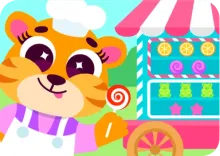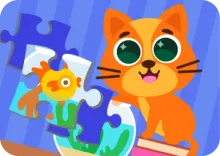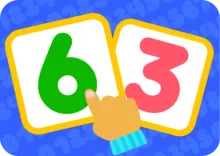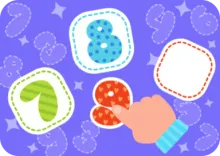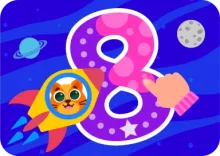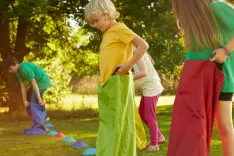Learning the multiplication table easily and with fun: how can games help with this?
Multiplication games help kids practice facts through patterns, strategy, and repetition that feels like play. These ideas support fluency and confidence while keeping learning active, social, and motivating.
Table of contents

Fun multiplication games for kids to practice times tables
Multiplication is one of the fundamental skills that children master in elementary school. Quite often, it becomes a stumbling block: rote memorization of the multiplication table can be boring, exhausting and, most importantly, ineffective. This is exactly when young learners who were once enthusiastic and curious about math suddenly lose interest and, even before starting school, become disillusioned with the subject. But it is within our power to take a different path – one where a child does not see the multiplication table as the main enemy and the source of all troubles.
The solution lies in a game-based approach! Multiplication games for kids turn a routine process into an exciting adventure where each problem is not just a task but a step towards victory. This method not only helps memorize multiplication facts but also promotes a deeper understanding of the concept, develops logical thinking and boosts self-confidence. A game-based approach also helps children clearly see how the multiplication operation works, instead of just memorizing numbers and results.
Why are Multiplication Games so important for mastering math?
The game format in the context of multiplication has many advantages that go far beyond simple memorization. Here are the most essential ones:
- Engaging Learning. A game is naturally engaging and motivating. When multiplication becomes a game, children stop seeing it as a boring duty and start to view it as an interesting puzzle or challenge. This reduces stress and increases the desire to learn.
- Conceptual understanding. Many multiplication games are designed so that children can clearly see that multiplication is repeated addition or a way to quickly count the number of items in groups. This helps them not just memorize “3x4=12” but understand that it is “3 groups of 4” or “4 groups of 3”.
- Automaticity and fluency. Regular practice in a playful form helps achieve automatic recall of multiplication facts. This means a child does not waste time thinking over each problem, which is critical for solving more complex math problems in the future.
- Development of problem-solving skills. Many multiplication games for children require applying multiplication in game scenarios, which develops logical thinking and the ability to find solutions in new situations.
- Boosting confidence. Success in a game, even if it is a small win, raises a child’s self-esteem and strengthens their belief in their own math skills, especially when it comes to elementary math games.
Multiplication games can be adapted for different types of learners: kinesthetic (through movement and physical actions), visual (through flashcards, diagrams and digital games) and auditory (through speaking examples aloud and rhymes).

Help your child
grow with Keiki
We’ll help you turn everyday screen time into real learning progress.
Try KeikiScreen-free multiplication games – learning multiplication without gadgets
Games that do not require gadgets or the Internet are perfect for mastering basic concepts. They encourage creativity, communication and physical activity.
For the youngest (2–3 years old) – laying the foundation
Of course, this does not mean raising a math genius at the age of two. It simply makes no sense and even harms the child. But at this age it is important to lay the foundation by showing that multiplication is a quick way to count groups. Through a gradual path from simple to complex, progress is possible. We have collected several accessible ideas.
Group game
Use any small objects (LEGO blocks, candies, toys). Ask the child to make groups: “Make 3 groups of 2 blocks. How many blocks are there in total?” This clearly demonstrates the concept of multiplication as repeated addition.
Counting by skips
Let the child jump along a “number path”, saying only every second, third or fifth number. For example, for counting by twos: “2, 4, 6, 8...”. This develops number sequencing and is a direct way to understand the multiplication table.
Building arrays
Clearly show multiplication by laying out objects in rows and columns. For example, 2 rows of 4 buttons show that 2x4=8. This is a powerful visual math learning tool.
For preschoolers and younger schoolchildren (4–5 years old) – the beginning of an exciting journey
At this age, children are ready for a more conscious introduction to multiplication. They can even master simple parts of the table.
Multiplication flashcards
Create or buy flashcards with multiplication problems on one side and answers on the other. Play “speed” rounds, checking how quickly the child can give the answer. You can hold a contest to see who gives more answers in one minute.
Buzz game
Players take turns saying numbers in order. When a number is a multiplier (for example, 5) or a multiple of it, instead of the number they must say “Buzz!”. For example: 1, 2, 3, 4, Buzz!, 6, 7, 8, 9, Buzz!
Dice multiplication
An excellent option from learning multiplication games. Roll two six-sided dice. The numbers that come up must be multiplied. Whoever gives the correct answer faster gets a point. You can use dice with more sides for more difficult problems.
Math Bingo
Prepare cards with answers to multiplication problems. The caller announces a problem (for example, “3 times 4”), and players look for the answer on their card and cross it out. The goal is to complete a line.
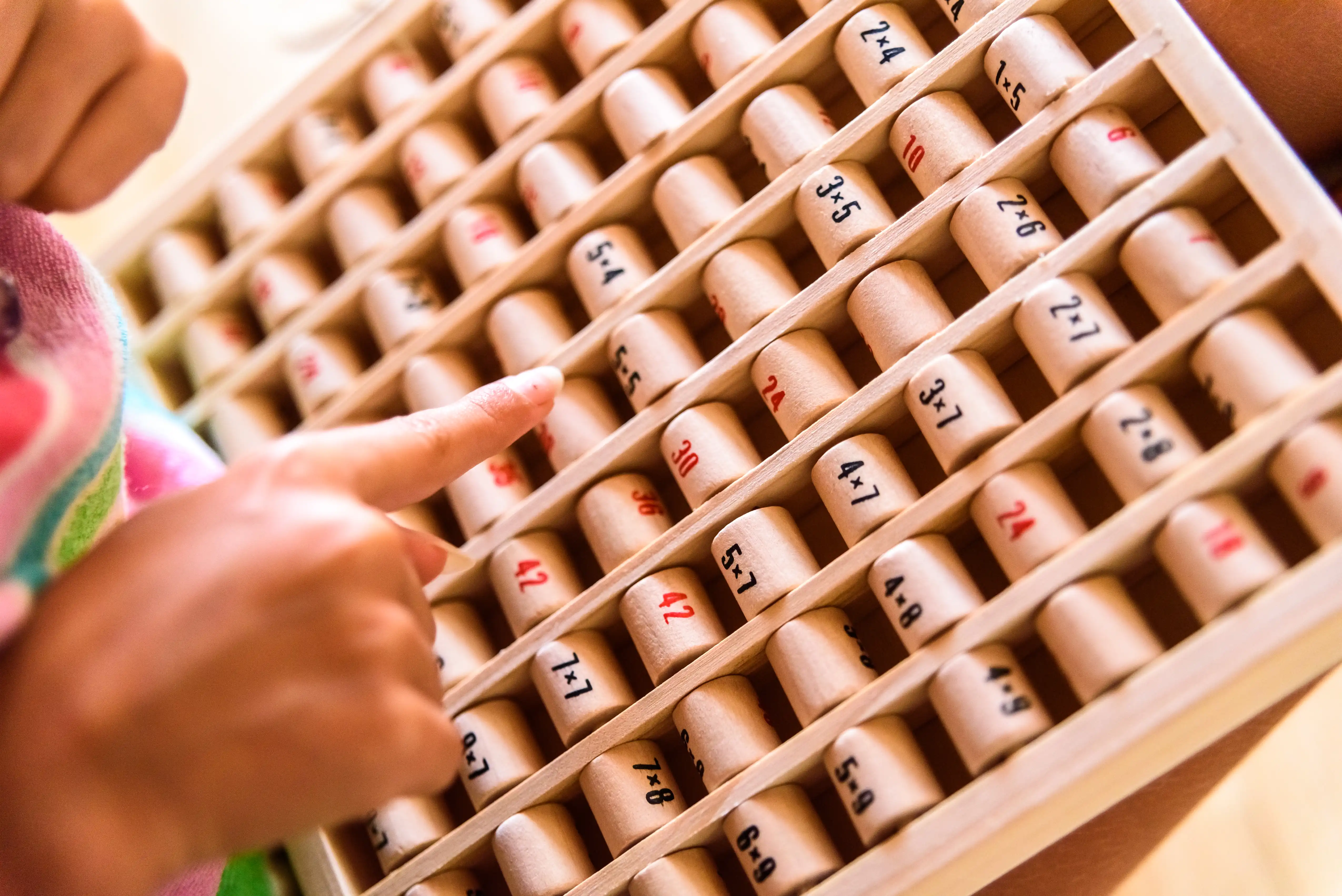
For older children (6+ years old) – full-fledged learning multiplication tables
When the basics are laid, you can move on to actively memorizing multiplication facts and playing more complex games.
Hopscotch with multiplication
Draw a hopscotch grid on the ground, but instead of numbers, write multiplication problems or answers. The child jumps on the squares, solving the problems or naming the factors for the answers.
Multiplication War
Use a regular deck of cards (without picture cards, or picture cards = 10, Ace = 1 or 11). Each player takes two cards and multiplies their values. The one with the higher product takes the cards. This is an excellent card game for math.
Multiplication Board Games
You can create your own board game: each square contains a multiplication problem, and along the way there are bonuses or obstacles. Or you can use ready-made educational board games.
Around the World
Players sit in a circle. The caller quickly announces a multiplication problem. The first player to give the correct answer moves to the next seat, “overtaking” the opponent.
Related Games in Keiki App
Digital Multiplication Games: interactive platforms for multiplication
Digital games can become a powerful learning tool, offering interactivity, visualization and gamification that make the process engaging and effective. Among them is Keiki. The app is designed for the youngest children, and although it does not focus directly on the multiplication table for schoolchildren, it lays the fundamental concepts necessary to master it:
- Interactive Counting Games – Keiki offers many games where children count objects in groups, which is an ideal preparation for understanding multiplication as repeated addition.
- Logical puzzles with quantities – tasks where children need to distribute items into groups and understand their total number develop logical thinking and prepare them for free multiplication in the future.
- Number pattern recognition – games for continuing number sequences and finding missing numbers, which is a basic skill for understanding times tables.
- Attractive math tasks – from matching numbers to simple addition problems – Keiki makes math fun and accessible for early development.
- Keiki also offers a completely safe learning environment, free from distracting ads and unwanted content, which allows children to fully immerse themselves in play and learning.
Other popular platforms
For preschool and school-age children, there are many other excellent multiplication apps for kids that specialize in the multiplication table:
- Times Tables Rock Stars – a popular platform that turns learning multiplication into a rock star competition
- Math Blaster – a classic gaming platform with space adventures and math problems
- Prodigy – an RPG game where solving math problems is required to defeat monsters
- SplashLearn – offers a wide range of educational math games, including multiplication
- IXL Learning – a comprehensive platform with a variety of exercises in math and other subjects
Benefits of multiplication games for all-round development
Multiplication games are not only a way to learn the multiplication table but also a powerful tool for developing a wide range of skills:
- Cognitive skills – games actively train memory (memorizing facts), attention (focusing on a task), information processing speed (quick responses) and mental flexibility
- Logical thinking – understanding relationships between numbers, properties of multiplication and developing strategies in games build logic
- Confidence – every correct answer and every win in a game raises the child’s self-esteem and belief in their own math abilities, which is critical for math confidence for kids
- Strategic thinking – some games require developing tactics and planning moves, which develops critical and strategic thinking
- Positive attitude towards learning – turning math into a game shapes a positive attitude towards the subject, laying the foundation for a love of learning
Help your child thrive with playful learning
Turn screen time into real growth with Keiki’s educational games.
Try KeikiHow to integrate games into everyday life?
To make learning multiplication through games as effective and enjoyable as possible, make it fun. Let it be a reward, not an obligation. Avoid pressure and coercion. Allow the child to choose the game or format themselves. The main thing is that the process brings joy.
As for frequency and duration, short but frequent sessions work best. It is better to play for 5–10 minutes every day than to have long, exhausting lessons once a week. Regularity is the key to success.
Also, use examples from real life. Show how multiplication applies in everyday situations: “We have 4 plates and there are 2 cookies on each plate. How many cookies are there in total?”. But always encourage progress. Celebrate even small successes. Praise and small rewards (not necessarily material) motivate the child to continue.
Alternate fun multiplication games. Use different types of games (flashcards, dice, board games, apps) so the process does not get boring and engages different aspects of memory and thinking.

